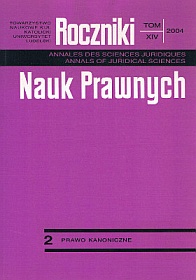The Institution of Permanent Defender in the Code of Canon of 1983
Abstract
The Church, especially after Vatican Council II, among all entitlements granted to particular groups of the faithful places as the first the entitlement granted to all christifideles. One of these entitlements is the natural right of the party in a lawsuit to legal support in vindicating his or her entitlements. Its practical realisation is brought about by allowing the parties in a canon suit the right to legal defence. Against this background the role of barrister as a specialist in canon law is principal. He may give advice, counsel, and defends the interests of his client by quoting appropriate legal regulations and facts. Taking part in court together with the parties, not as their proxy, he may help and accompany them, being a mouthpiece of their interests.
The code of canon law of 1983 in can. 1490 recommends that in each church tribunal – if its possible – be established permanent defenders. They should be paid by the same tribunal and would be barristers or proxies, helping the parties in lawsuits, above all in marital cases.
The principal motive underlying the establishment of the office of permanent defender with a tribunal was to provide all the faithful, especially the poorest ones, with equal access to justice and defence of their entitlement in the Church. A permanent barrister, being a worker of the tribunal, is always at the disposal of the legal vicar. Having reviewed the complaint and respective documents, he may grant a party the right to defence free of charge by appointing a barrister one of the permanent defenders with a given tribunal.
The office of permanent barrister better guarantees to reach the objective truth, and ensures that the requirement for the lawsuit to be conducted within appointed time be satisfied. Lowering the costs of the lawsuit, he also ensures an equal access to justice, irrespective of whether the parties are well-off or not.
Despite such evident arguments in favour of barristers taking part in canon lawsuits, the experience shows that in many diocesan courts such an office has not been established. These and many others reasons and needs made the universal church legislator to establish the office of permanent defender in church tribunals, so that to ensure a competent legal support for the parties in a lawsuit. One should wish that also in our church tribunal the parties could have the benefit of a professional defender.
Copyright (c) 2004 Roczniki Nauk Prawnych

This work is licensed under a Creative Commons Attribution-NonCommercial-NoDerivatives 4.0 International License.


